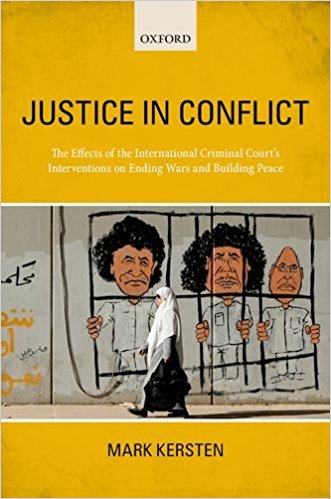 AMAZON: What happens when the international community simultaneously pursues peace and justice in response to ongoing conflicts? What are the effects of interventions by the International Criminal Court (ICC) on the wars in which the institution intervenes? Is holding perpetrators of mass atrocities accountable a help or hindrance to conflict resolution? This book offers an in-depth examination of the effects of interventions by the ICC on peace, justice and conflict processes. The ‘peace versus justice’ debate, wherein it is argued that the ICC has either positive or negative effects on ‘peace’, has spawned in response to the Court’s propensity to intervene in conflicts as they still rage. This book is a response to, and a critical engagement with, this debate.
AMAZON: What happens when the international community simultaneously pursues peace and justice in response to ongoing conflicts? What are the effects of interventions by the International Criminal Court (ICC) on the wars in which the institution intervenes? Is holding perpetrators of mass atrocities accountable a help or hindrance to conflict resolution? This book offers an in-depth examination of the effects of interventions by the ICC on peace, justice and conflict processes. The ‘peace versus justice’ debate, wherein it is argued that the ICC has either positive or negative effects on ‘peace’, has spawned in response to the Court’s propensity to intervene in conflicts as they still rage. This book is a response to, and a critical engagement with, this debate.
Building on theoretical and analytical insights from the fields of conflict and peace studies, conflict resolution, and negotiation theory, the book develops a novel analytical framework to study the Court’s effects on peace, justice, and conflict processes. This framework is applied to two cases:
Libya and northern Uganda. Drawing on extensive fieldwork, the core of the book examines the empirical effects of the ICC on each case. The book also examines why the ICC has the effects that it does, delineating the relationship between the interests of states that refer situations to the Court and the ICC’s institutional interests, arguing that the negotiation of these interests determines which side of a conflict the ICC targets and thus its effects on peace, justice, and conflict processes.
While the effects of the ICC’s interventions are ultimately and inevitably mixed, the book makes a unique contribution to the empirical record on ICC interventions and presents a novel and sophisticated means of studying, analyzing, and understanding the effects of the Court’s interventions in Libya, northern Uganda – and beyond.

